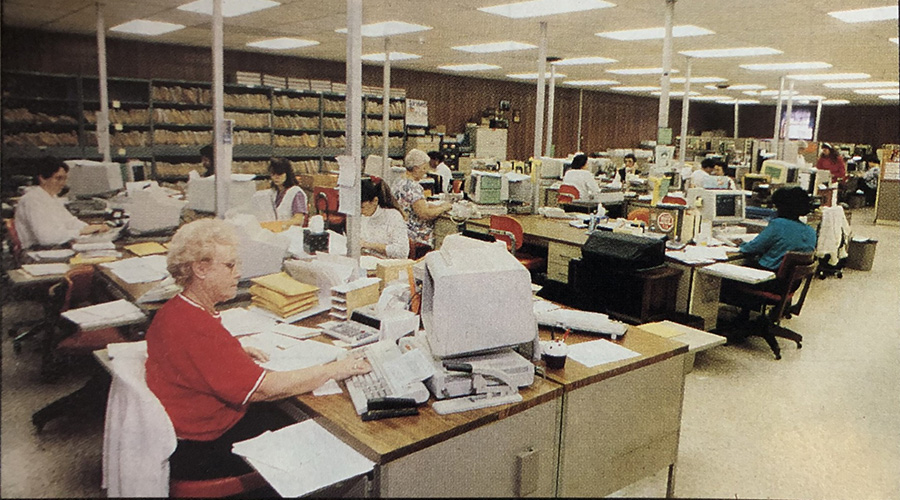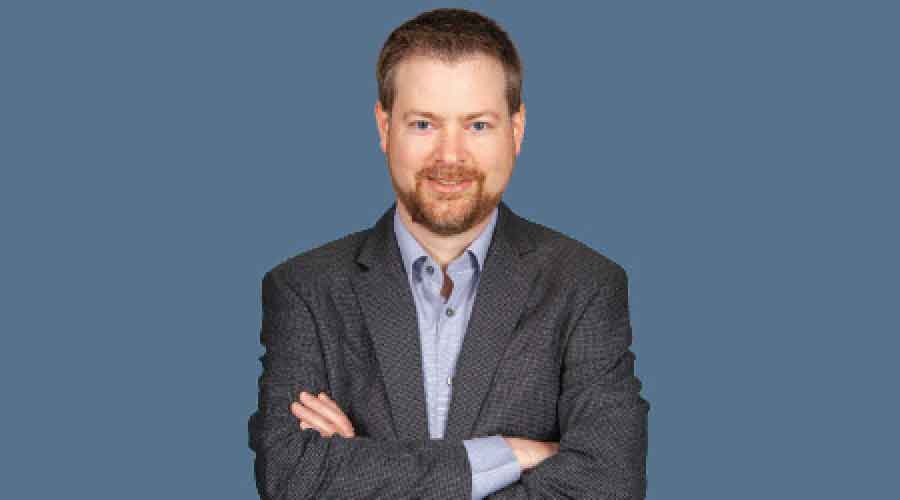Solar, Integrated Project Delivery Illustrate Dean's Emphasis on Strategic Thinking
Part 2 of a 3-part cover story profile of Brian Dean, vice president and head of facilities management at T. Rowe Price.
What stands out in Dean’s approach, Meyd says, is his emphasis on internal-customer service with his teams and his strategic thinking. “He’s always thinking not one step, but two steps ahead,” Meyd says.
Dean looks for ways to make T. Rowe Price “appropriately innovative,” Meyd says, and the company’s first solar project is a prime example. The company recently had 7,000 solar panels installed above four parking garages at its Owings Mills campus, a project designed to provide 15 percent of the electricity for the buildings it supports. As Dean began educating himself about solar energy, he wasn’t sure if it made sense for T. Rowe Price. “Over time, as we built the business case, it turned out to be just a very good business case as well as a very good environmental case,” he says.
Another Dean initiative that has received high marks was using the contracting method called integrated project delivery (IPD) for major renovations on two T. Rowe Price buildings. The genesis, Meyd says, was a feeling that traditional methods had often created too much finger-pointing, too many change orders, and too much reactivity on the part of T. Rowe Price. With IPD, he notes, “everyone has some skin in the game.” IPD uses an agreement that incentivizes stakeholders to work together and put the interests of the project first.
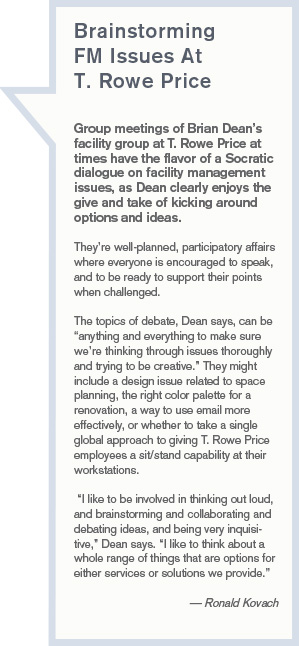 Dean educated himself about IPD after reading about it, by chance, in a book a colleague loaned him. The more he learned, the more he thought IPD made sense for his company. As Dean explains it, under IPD, all of a project’s team members help create the project budget, and part of that budget — the incentive compensation layer — is their fee, which is 100 percent at risk. “It’s their combined fees in one pool that will rise as the team collectively finds savings, or will reduce if there are unforeseen cost overruns as part of the cost of work,” he says. “Everyone is at the table equally and opinions are weighted the same.“
Dean educated himself about IPD after reading about it, by chance, in a book a colleague loaned him. The more he learned, the more he thought IPD made sense for his company. As Dean explains it, under IPD, all of a project’s team members help create the project budget, and part of that budget — the incentive compensation layer — is their fee, which is 100 percent at risk. “It’s their combined fees in one pool that will rise as the team collectively finds savings, or will reduce if there are unforeseen cost overruns as part of the cost of work,” he says. “Everyone is at the table equally and opinions are weighted the same.“
Dean’s ultimate goal with IPD was to generate innovation and collaboration, spend less money on buildings, renovate them quicker, and get a better product in the end. It is, he says, “another example of innovating to consume less of the firm’s financial resources. We don’t just say ‘What do we cut?’ but ‘How do we innovate?’ ”
When it came time to expose T. Rowe Price to open-space office design, Dean took the lead in a memorable fashion: He had his own office dismantled in favor of a height-adjustable desk next to a private huddle room — surely a rare behavioral strategy for a global vice president. His reasons were two-fold. First, his relatively small group works closely together, and he strives for the team to be well-integrated. A hierarchy in which some people were in offices and some in open plan ran counter to that, he felt. The other reason was to have his group serve as an educational pilot case for the company on open-space design. “The way the millennials work is much different than how I worked,” Meyd observes, “and Brian is very conscious of that and pursuing the work strategies that will retain and attract as we’re recruiting around the world.”
Moving the company in new facility directions has meant making presentations in the C-suite, and Dean has seen first hand the importance of understanding how top management thinks and speaks, and then making presentations in the same manner. “The senior management at T. Rowe Price are analysts, at the core,” he says. “Presenting the numbers is key. I’ve learned to tailor my presentations and conversations so that they are analytical in nature. That’s helped us be successful in our interactions with the C-suite.”
Dean has earned the Series 99 license, which certifies basic knowledge of the securities industry. The license, he says, gave him a great understanding of the regulatory environment T. Rowe Price must work in, and equipped him to better structure his team and consider the right requirements and controls to put in place. “I think we as facility management professionals are experts in non-core areas of our company,” he says. “And so, while we’re not core to the company’s mission, it’s incumbent upon us to have a good understanding for the core business of the company, because we can better support them if we know their world and can speak in their terms, rather than requiring that they speak in our terms.”
Thinking Ahead
A typical day for Dean includes time devoted to strategic planning, and he’ll generally think about three years ahead at the most, given all the variables in the investment field. He’ll consider such issues as where the company needs more space, how its business groups are growing and changing, and the right strategies to support these changes. He works regularly with his teams to make sure they’re well-organized, adequately resourced, and thinking about the right things. He’ll talk to key contacts in the T. Rowe Price business units about how their business is changing and how facility management is supporting them.
High on his list of ongoing challenges is understanding how to work in global markets — which means understanding cultures, resources, products, and partnerships — and being willing to depart from traditional approaches.
A related issue is technology: T. Rowe Price’s employees expect all of the business units and buildings to be technology-enabled. “And so,” Dean says, “we spend a lot of time in understanding, how do we embrace technology to deploy it at the right pace to provide better services, provide better workplaces, and consume less financial resources? How do we automate and use technology in ways that allow our buildings to operate more efficiently, more effectively — from an air quality, thermal comfort, and lighting-level standpoint? How do we interact with our customers and how do our customers interact with us in terms of letting us know what a problem is?”
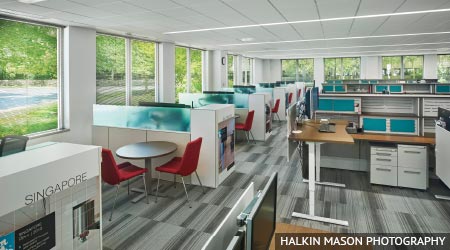
Caption: Dean and his direct reports led by example in the move to open workplace design, giving up enclosed offices for workstations. Shown here is space where some of the facility staff works.
Colleagues describe Dean as almost invariably calm and collected, open-minded, and passionate about his work. He’s a nice guy, they say, with a good sense of humor, perhaps a bit of a workaholic.
“Somebody like Brian you don’t come across every day in terms of his intellect, and being visionary and strategic,” says Leah Moore, manager for workplace solutions for Maryland. “He really has a sense of direction for our future, where the industry is going. He is a leader; he inspires all of us to do better every day.”
Another colleague, Kelli Costa, who manages facilities and services from the company’s Colorado Springs campus, says Dean is very much an influencer at the company’s upper levels. “He has very much pushed T. Rowe Price to think more openly, to try new things, to start moving towards where the rest of the industry is, from an FM perspective,” she says. “There certainly has been some risk in that, but I think it’s paid off well for him; he’s very well respected by all levels of management.”
Dean wants his groups to stay aware of the world outside T. Rowe Price to avoid insularity, and to stay current on technology, trends, services, and products. When new challenges arise, a strong network of industry peers, accessed through organizations like BOMA, IFMA, and CoreNet, can be a valuable source of knowledge, he says.
“I think one of the great things about Brian is that he really empowers his direct reports, and the rest of his team as well, to make their own decisions,” Moore says. “He trusts us and inspires us to raise the bar higher.”
Costa says Dean provides his team ample opportunities for professional growth. “He’s very much a visionary — his mind is constantly working,” he says. “He sees opportunities out in the industry and he goes and investigates those, and he wants us to do the same.”
What ultimately drives him, Dean says, is the stimulation of responding to challenges, as well as, in his formative years, the example of his parents’ work ethic. “I guess it’s just innate,” he says after some thought. “It’s a desire and an interest to always be challenged, because that’s what excites me.”
Nearing the 10-year mark at T. Rowe Price, Dean says he’s pleased to have seen his team evolve into an effective, well-integrated group. “I’m very proud when I walk around our buildings and see how our spaces are being used and how our services are being consumed, and to know that we built the team that has done that.”
Send comments and questions to ronald.kovach@tradepress.com.
Related Topics:








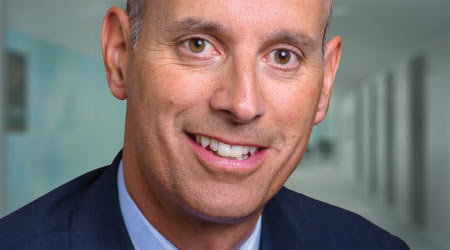
 Dean educated himself about IPD after reading about it, by chance, in a book a colleague loaned him. The more he learned, the more he thought IPD made sense for his company. As Dean explains it, under IPD, all of a project’s team members help create the project budget, and part of that budget — the incentive compensation layer — is their fee, which is 100 percent at risk. “It’s their combined fees in one pool that will rise as the team collectively finds savings, or will reduce if there are unforeseen cost overruns as part of the cost of work,” he says. “Everyone is at the table equally and opinions are weighted the same.“
Dean educated himself about IPD after reading about it, by chance, in a book a colleague loaned him. The more he learned, the more he thought IPD made sense for his company. As Dean explains it, under IPD, all of a project’s team members help create the project budget, and part of that budget — the incentive compensation layer — is their fee, which is 100 percent at risk. “It’s their combined fees in one pool that will rise as the team collectively finds savings, or will reduce if there are unforeseen cost overruns as part of the cost of work,” he says. “Everyone is at the table equally and opinions are weighted the same.“


